|
CHAPTER XV.
BIOGRAPHICAL NOTES
pg. 244
THE PEPPERRELLS
- 244 *
MAJOR CHARLES
FROST - 254
GEN. WILLIAM
WHIPPLE - 255 *
HON. MARK
DENNETT - 257
GEORGE
MELVILLE FROST - 258 *
JOHN
SAMUEL HILL FOGG, M. D. - 259 *
GOV. JOHN
FREMONT HILL - 261 *
MOSES A.
SAFFORD, ESQ. - 265 *
HON. HORACE
MITCHELL - 266 *
Much that might be
said in this chapter will be found in the genealogical
notes. There are, however, some historical personages
that demand a more full treatment than could well be given
there. It is quite impossible to here mention all who
have left an honorable record. A few out of many are
introduced to the reader, of whom much has been written
elsewhere.
| The
PEPPERRELLS
COL WILLIAM PEPPERRELL was a
native of Ravistock Parish, Plymouth, in Devonshire,
England, where he was born in 1646. His speech
indicated that he was of Welsh origin. Nothing
definite has been published concerning his ancestry.
When a boy he was apprenticed to the captain of a
fishing-schooner employed off the coast of New
England and the banks of Newfoundland. His
parents died early leaving two or three sisters to
be helped. One of these married a Phillips,
and her sons settled in Saco and Kittery.
Another probably married Hon. Robert Eliot.
William Pepperrell first began business in the
fisheries at the Isles of Shoals. After a few
years he married Margery, daughter of John
Bray of Kittery, and in 1682 settled at the
Point, where he built a house on a small lot given
him by his father-in-law. Here he prospered in
business and is said to have become the wealthiest
man in New England. This did not then imply
the possession of a large fortune. A man worth
one hundred thousand dollars was then a very rich
man. He built many fishing and trading vessels
and sent them to the Banks, to the West Indies and
to Europe. He became a leader in the affairs
of the colony. He was justice of the peace
thirty-five years and from 1715 till his death he
served as judge of the court of common pleas.
He had command of the fort near his place of
residence with rank of captain and in the militia
rose to the rank of Lieutenant-Colonel. He was
one of the founders of the Congregational Church at
Kittery Point and remembered it in his will.
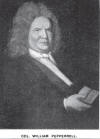
COL. WILLIAM PEPPERRELL
For some
account of his family see Genealogical Notes.
He died 15 Feb. 1734, and was buried in the middle
of an orchard near his house. Here a marble
structure was erected to his memory by his son,
William, about the year 1736.1
It was purchased in London at the cost of
thirty-four pounds, eleven shillings and four pence,
and was repaired over thirty years ago by the
descendant, Miss Harriet Hirst Sparhawk.
Margery (Bray) Pepperrell died about seven years
later than her husband. She was mentioned in
the Boston Post Boy, under date of 30 April 1741, as
follows: "She was, though the whole

PEPPERRELL TOMB
course of her life, very exemplary
for unaffected piety and amiable virtues,
,especially her charity, her courteous affability,
her prudence, meekness, patience, and her
unweariedness in well-doing. She was not only
a loving and discreet wife and tender parent, but a
sincere friend to all her acquaintance."
The house built by Col. William Pepperrell in
1682 must have surpassed in grandeur any residence
in the province. Its spacious hall and
staircase are still admired and imitated by recent
architects. The house was originally built
with about its present dimensions. Sir
William added fifteen feet to each end of it,
and these additions were taken away by a subsequent
owner, so that the present external appearance of
the Pepperrell Mansion, saving the
curb roof, is about as it was in the days of the
elder Pepperrell. The rooms are
spacious and the outlook over the harbor is a
commanding and delightful one. The cellar and
foundations seem never to have been well built.
It is reported that some have it in mind to purchase
this house and use it as a public historical museum.
Its associations demand this, and the people of
Maine should see to it that this historical landmark
be well cared for and devoted to patriotic and
educational purposes.
The description of the Pepperrell mansion given
by Mr. Pelatiah Fernald in 1849, is
sufficiently minute and accurate. "It was
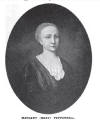
MARGERY (BRAY) PEPPERRELL
a square house about forty-five feet
long and of the width that it now is and had two
chimneys, with a sharp roof. Col.
Pepperrell carried on the fishing business.
At his decease his son, Sir William Pepperrell,
took possession of the estate. He made
additions of about fifteen feet on both ends of the
house and altered the roof to the present form and
revised it throughout and built the wharf and four
stores and built the tomb and extended his land from
ten partition wall between Capt. John Underwood,
now Joanna Mitchell, and now the Thomas
Hoyt, from this line westward up to the lane
leading down to Capt. Robert Follet, now
J. Lawrence. On the north of the Mansion
House was the Great Orchard, so called, in the
middle of which he built the tomb. After the
war commenced Sir William Pepperrell's estate
was called Tory property, and many thought
that they might destroy it at pleasure. In the
year 1774 my father moved.

THE PEPPERRELL MANSION.
into the Mansion House, so called,
to take care of it, Col. Sparhawk, having
previously built a house for Lady
Pepperrell, so called, widow of Sir William.
Said house is owned by Capt. Joseph Cutts,
where she lived the remainder of her days and died
there. At the end of the Revolutionary War all
Sir William's estate was considered
confiscated or Tory property, because it belonged by
will to William P. Sparhawk, who had fled his
country and joined our enemies. Therefore our
government had orders to sell at public auction all
the land and buildings formerly belonging to Sir
William Pepperrell as Tory property.
Beginning with the Mansion House about the year
1790, as well as I can remember, Capt. Samuel
Smallcorn bought the Mansion House and the two
lots, one on which stands and the other owned now by
Capt. Daniel Frisbee, together with the wharf.
In the same or next year Thomas D. Cutts
bought the said Mansion House of Capt. Smallcorn
and commenced a tavern and carried on fishing and
built the store the Capt. Daniel Frisbee now
occupies. Major Cutts set out all those
elm trees
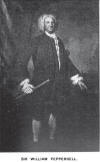
SIR WILLIAM PEPPERRELL
around the premises. He
flourished for some time, but there was a leak under
the house, and in a few years it leaked out and by
mortgage became Richard Cutts' property.
He carried on fishery and foreign trade for many
years, abut trusting too much to other people's
honesty, he fell in the rear and sold the house and
lands to Elder J. Meader and Capt. Jesse
Frisbee. Capt. Frisbee in a few
years was lost at sea. Elder Meader
sold the old Mansion House to Charles G.Bellamy,
Esq., and Mr. Thomas Hoyt in the year
1848. They divided the land and took off the
bend or room from each end of hte house and left it
in the same from on the ground that Col. William
Pepperrell built it. It is now (1849)
owned by Charles G. Bellamy, Esq., who has
made a very large repair, and it is likely it may
stand another century, excepting fire, as it has
stood though all the past."
Sir William Pepperrell was born 27 June 1696. He
had only meager education that could be obtained in
the public schools of his time. He was taught
to do business, to survey land, to sail a ship, to
act as clerk, to manage men. By trading in
fish, lumber and West India goods, by extensive
ship-building, and by the purchase and sale of large
tracts of land he became very wealthy. At one
time he owned the greater part of Saco and
Scarborough. Saco was first called
Pepperrellborough in his honor He was a
justice of the peace at the age of twenty-one and
captain of a company of cavalry. At the age of
thirty he held the rank of colonel and was in
command of all the militia of Maine. About the
same time he was appointed one of the Governor's
council and held that office thirty-two years,
eighteen of which he was president of the board.
The people of Kittery elected him as their
representative in 1726-7. The office of chief
justice he held from 1730 till his death. This
obliged him to give some study to law, though he had
been from youth familiar with court procedures,
having been clerk of court. Like his father he
was the owner of slaves. a boat's crew of them
used to row him across the harbor. He seems to
have been the banker of Kittery and a large region
about, and many a mortgage in his favor is recorded
in the York Deeds.
He was appointed in 1745 to command the expedition
against Louisburg, and contributed out of his
private fortune five thousand pounds toward the
expenses of that campaign. All know the
result. What had been regarded as an
impregnable fortress surrencered after a brief
siege. In this expedition Pepperrell
was accompanied by many of his townsmen as soldiers,
and fifty men under Captain Moses Butler went
from Berwick. For his success at Louisburg he
was knighted and received in London with many
attentions. In 1745 he was commissioned
Lieutenant-General in the royal army.
He united with the church at Kittery in 1734 and was
prominent in its business affairs. George
Whitefield was entertained at his house and
consulted with reference to the Louisburg expedition
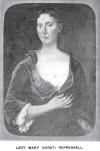
LADY MARY (HIRST) PEPPERRELL
through Pepperrell did not
follow his advice. The honors received at home
and abroad did not separate him from the
companionship and sympathies of his townsmen.
The remainder of his life was comparatively
uneventful, and he died 6 July 1759.

LADY PEPPERRELL'S HOUSE
He was buried in the vault beneath
the Pepperrell tomb, and the pall that
covered his bier is still preserved by the church at
Kittery Point and draped the pulpit at the funeral
services held in honor of President McKinley.
He married Mary Hirst of Boston, in1723.
After his death or about 1765, she caused a house to
be built near the church,

HALL OF LADY PEPPERRELL'S HOUSE

PARLOR OF LADY PEPPERRELL HOUSE
where she resided till her dath, 25
Nov. 1789. The house is now occupied by J.
Chester Cutts. Its appearance without and
within is about as it was in the days of Lady
Pepperrell. The accompanying pictures tell
more than words can. The hall and parlor have
the same furniture as in the old days. The
nicely laid wooden floors and the curiously carved
post at the foot of the stairs evidence the fine
workmanship of the builders.
Most of the property of Sir William Pepperrell
was willed to his grandson, William Pepperrell
Sparhawk, on condition that he should drop his
surname on arriving at the age of twenty-one.
This he did and became the second Sir William
Pepperrell. The estates bequeathed by the
first Sir William were confiscated in
1778, since their owner was a Tory. The large
fortune accumulated by Sir William and his
father was soon dissipated, and some of his
descendants came to indolent price in their lineage
and seek to perpetuate the memories of the great men
who honored their town and their country by noble
and patriotic services.
------------
1.
So it is recorded in Parsons' Life of Sir William
Pepperrell, but the elder Pepperrell's
daughter, Joanna Jackson, was "decently
Interr'd in her Father's new Tomb" 24 Feb.
1725-6. See Old Eliot, Vol. IV, p. 46.
|
MAJOR
CHARLES FROST.
Details concerning the life of this man have already
been given in these pages. He was one of the
first men of his times and town in civil, military
and ecclesiastical affairs. He was honored by
election as Deputy to the General Court in 1658 and
held that office five years. The date of his
commissioned as Sergeant-Major, 23 Aug. 1689, to
govern and exercise the military forces of the
Province of Maine as the law directs.1
His own petition to the General Court said that
"quickly after the death of Major Hooke in
the month of January 1694-5. Your petitionr
was Ordered by the Right Honble the Lt. Governr
to take the Conduct and Governmt of all the
officers & Souldiers under his Majtys
Pay in the County of Yorke."2
He was actively engaged in military service during a
large part of his life, leading expeditions for the
defence of Kittery and other towns. The
Indians hated him for the part he had in their
betrayal at Dover in 1675. They assaulted his
garrison house and finally laid in ambush for him on
his way home from church and so had their revenge.
He served for many years as Justice of the Peace, was
one of the Associate Judges of the Province of
Maine, and was a member of the Governor's Council in
1693. Perhaps no citizen of Kittery has held
more public offices or held them more worthily than
he. His own family and those with which the
Frosts were connected by marriage were the first
families of the Pascataqua settlement. For
many years the Frosts of Maine and New Hampshire
held the commanding influence in the affairs of town
and province. 3-------------
1. See his commission, Old Eliot. Vol. II,
p. 137.
2. Coll. of Me. Hist. Society, Vol. V, p. 434.
3. For other particulars of his life see article
by Miss Elizabeth M. Bartlett in Old Eliot,
Vo. I, pp. 85-101. |
| GEN.
WILLIAM WHIPPLE
Capt. William Whipple of Ipswich, born 28 Jan.
1695-6, married, 14 May 1722, Mary, daughter
of Robert Cutt 2nd. He settled in
Kittery, living in the old Cutt-Whipple
garrison house, which is still in use. His
children were recorded as follows: Maryb.
13 Jan. 1728, m. Hon. Robert Traill 1 Sept.
1748, d. 3 Oct. 1791; William b. 14 June 1730;
Hannah b. 15 Feb. 1734-5, m. Dr. Joshua
Brackett of Portsmouth 14 Apr. 1760, and d. 24
Apr. 1825; Robert Cutt, b. 6 Apr. 1736 and d.
4 May 1761; Joseph b. 14 Feb. 1737-8.
Capt. William Whipple died 7 Aug. 1751 and
was buried in the cemetery at Kittery Point.
His wife died 28 Feb. 1783, and was buried by her
son in the North Cemetery, Portsmouth.
Gen. William Whipple, son of the one just
mentioned, was fifth in descent from Matthew
Whipple of Ipswich. His opportunities of
education were only those of the common schools of
his time. At the age of twenty-one he had
command of a vessel and brought negro slaves into
this country. When twenty-nine years of age he
settled in Portsmouth, N. H., and engaged in
mercantile life. Here he married his cousin,
Catherine Moffat. He had two slaves
said to have been sons of an African Prince.
The fight for freedom in the Revolution led one of
his slaves to ask and receive his liberty.
He was chosen Representative to Congress, 23 Jan. 1776,
and served also for the three following years.
This gave him the opportunity to sign the
Declaration of Independence. In 1777 he was
appointed Brigadier General of the New Hampshire
troops, and he took part in the battles of
Stillwater and Saratoga.
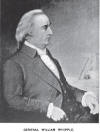
GENERAL WILLIAM WHIPPLE
In 1782 he was made Judge of the
Superior Court. All these offices were filled
with honor to himself and good services to his
country. He died 28 Nov. 1783, aged fifty-four
years. leaving no children. 1
-------------
1. For fuller sketch of his life see article by
Moses A. Safford, Esq., in the Proceedings of
the Me. Hist. Society, Vol. VI. pp. 337-357.
|
| HON.
MARK DENNETT The
man was one of the most influential characters in
the history of Kittery. Among his papers is
found a record of some events in his early life,
written by himself. He was born 28 Aug. 1786,
son of William and Mary (Adams) Dennett.
He says, "In early boyhood I hated the school until
about nine years old, when my fancy changed and I
liked the school and began to stand at the head of
my class. Our school privileges were very
limited. I attended to nothing at school but
reading, spelling and writing until I was thirteen
years old; but I progressed in the old arithmetic at
home under the instruction of my father and brother
to the rule of three. At thirteen years I
commenced the arithmetic at school and during winter
term I mastered about one-half of Merrill's
Arithmetic. In the spring of 1800 at a short
term of six weeks of Grammar School, I progressed in
English Grammar so that I could parse simple
sentences. In September a term of Grammar
School commenced and I attended to the study of
Latin, and during the winter I advanced into Virgil
and Cicero. In the spring of father said that
I must help him on the farm. In the winter of
1802-2 there was no Grammar School, and I mastered
the last half of the arithmetic. In the winter
of 1820-3 I studied Latin at home and recited my
lessons once a week with Rev. William Briggs.
Oct. 25, 1803, my father died and the care of the
farm devolved on me, and I was thus deprived of
school privileges. During the winter of 1803-4
I devoted every spare hour by day and very long
evenings to the study of Greek, and in December,
1804, I received a certificate of qualification for
teaching the Grammar School from three ministers who
were college graduates. Jan. 1, 1805, at the
age of eighteen, I commenced teaching the Grammar
School in Kittery, and excepting two or three yeas
(when otherwise employed) I continued to do so
several months each year until I was sixty years
old, when my hearing failed and I declined the
service.
"In 1807, my mind being religiously impressed, I was
baptized and joined the church, of which act I
never repented."
Mr. Dennett was
much interested in local history and left some
valuable papers that have been utilized in the
preparation of this book. He was honored as a
leader in his town, serving as selectman for
seventeen years. He was deputy to the General
Court, 1814-19, and was a member of the first
legislature of Maine. He was State senator
several times, justice of the peace, and captain and
major in the militia. He died 30 April 1883,
in the ninety-seventh year of his age. See
genealogy of the Dennett family, chiefly
compiled by him.
|
| GEORGE
MELVILLE FROST, M. D.
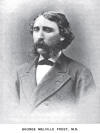
GEORGE MELVILLE FROST, M.D.
Son of Joshua and Catherine Shapleigh (Paul)
Frost, was born Apr. 27, 1843. He received
an academic education at South Berwick Academy, and
afterwards was admitted to Bowdoin Medical School.
There he received his degree in 1869. He
settled at once in Peabody, Mass., and began
practice that steadily increased in extent and
success.
An epidemic of small pox broke out soon after his
arrival and he came into prominence, both as a
physician and a member of the Board of Health.
He was a man of strong individuality and clung
tenaciously to his opinions until he was convinced
they were wrong. This was especially true in
respect to the method of treating diseases.
He was a close student of professional literature and
spent much time in London hospitals in 1876.
His general ability as a physician won for him the
confidence of constantly growing practice. He
was the oldest physician in town, both in years and
time of residence, a period of twenty-nine years.
His untiring devotion to his duties, continued after
he knew of his own mortal illness, endeared him to
large numbers. And many tributes were paid to
his worth both at the public funeral and
subsequently by his associates in the Massachusetts
Medical Society. Dr. Frost married 9
Oct. 1873, at Beverly, Mass., Asenath
Marshall, daughter of Paul F. and Anna (Lefavour)
Ober, who survives him without children.
|
| JOHN
SAMUEL HILL FOGG, M. D.
Dr. John Samuel Hill Fogg, son of William and
Betsey (Hill) Fogg, was born in Eliot,
May 21, 1826. He was fitted for college at
Eliot Academy, then under the charge of Israel
Kimball. After graduation he studied
medicine with Dr. Theodore H. Jewett, of
South Berwick, attended lectures in the medical
departments of Bowdoin, and Harvard, and received
the degree of M. D. from Harvard in 1850. He
settled in South Boston the same year. He
served many years on the Boston School Board, and
was representative to the Massachusetts Legislature
in 1855. He was a member of the Massachusetts
Medical Society; of the New England Historic
Genealogical Society; of the Virginia Historical
Society; and a corresponding member of the Maine
Historical Society.
Twenty-one years before his death, which occurred Oct.
16, 1893?, Dr. Fogg was stricken with
paraplegic paralysis, confining him closely to his
room and making him a constant sufferer. A
taste for genealogical and historic research, and a
youthful interest for collecting autographs,
occasionally gratified in _____ age,

JOHN SAMUEL HILL FOGG, M. D.
afforded employment and solace in
these years of ____, and from this slight beginning
a collection of autographs was formed in the
systematic manner with reference to historical?
data, the value of which at the time of his death
was estimated at twenty five thousand dollars.
His will provided that this collection should become
the property of the Maine Historical Society, and
provided also for the establishment of a free public
library in his native years.
"His unfailing brightness of mind, and patience under
the most excruciating suffering, together with the
work that he has accomplished, make his case one of
the most marvellous in the annals of invalidism."
Dr. Fogg married first, July 11, 1850, Sarah
Frances Gordon, of Exeter, N. H., who died Mar.
21, 1871; and second Mary Griselda Clinch,
youngest daughter of Rev. Joseph H. Clinch,
D. D., of South Boston, who survives him.
|
| GOV.
JOHN FREMONT HILL
John Fremont Hill, M. D., Governor of Maine,
born in Eliot, Oct. 29, 1855, was the son of
William and Miriam (Leighton) Hill. His
ancestors on both sides have been distinguished men
in their day, and the public spirit and interest in
the affairs of state which characterize the subject
of this sketch seems to be hereditary. Dr.
Hill's father, William Hill of Eliot, was
in the sixth generation of direct descent from
John Hill of Dover, who was born in England in
1624/
Governor Hill's mother was Miriam Leighton,
eldest daughter of Andrew Pepperrell Leighton
of Eliot, who several times represented his district
in the State Legislature, and was State senator for
a number of years. Sarah Catherine Odiorne,
grandmother of Governor Hill, was a
descendant of Capt. John Mason, the original
grantee of the Providence of New Hampshire.
He was educated in the public schools, South Berwick
(Maine) Academy, and the Putnam School in
Newburyport, Massachusetts; studied medicine and
graduated at the Maine Medical School, Brunswick,
completing his studies in his profession at the Long
Island College Hospital, Brooklyn, New York.
After leaving college, Dr. Hill practiced
medicine for about a year in Boothbay Harbor, but
very soon decided to devote his attention to a
business career.
In 1879, he came to Augusta and went into business with
Hon. P. O. Vickery, and soon after became his
partner, under the firm name of Vickery & Hill.
This firm, now a corporation - The Vickery & Hill
Publishing Company - is one of the largest
publishing houses in the business, with branch
offices in Boston, New York and Chicago.
Within a short time a substantial fire-proof
building, with the former establishment, in order to
accommodate the constantly increasing business of
the Company.
Governor Hill has taken an active part in the
politics of his native State, having always been
identified with the Republican party. In 1889
he was elected Representative from Augusta to the
Maine Legislature, and served on the Committees of
Banks and Banking, and of Railroads, Telegraphs and
Expresses. In 1891 he was again elected
Representative, and served as Chairman of the House
Committee on Railroads. In August, 1892, he
was nominated by acclamation as senator from
Kennebec County, and sat in the Legislatures of 1893
and 1895 in that capacity, being Chairman of the
important Railroad Committee both terms. He
was a Presidential elector in 1896, and a member of
Governor Powers' Council during the
years 1899 and 1900.
At the September election of 1900, Dr. Hill was
elected Governor of Maine, by one of the largest
majorities ever given in the history of the State.
He was inaugurated in January, 1901, delivering an
able and business-like address to the Legislature.
The manner in which he is administering the duties
of his office proves that the State is extremely
fortunate in the choice of its Chief Executive.
Governor Hill has been interested in electric
railroad development in Maine for some time, being a
leading promoter of hte Augusta, Hallowell &
Gardiner Electric Railroad, which within the past
year has extended its line to Togus, the location of
hte Eastern Branch of the National Home for Disabled
Soldiers, and it is proposed to still further extend
it to connect with the Rockland, Thomaston & Camden
Street Railway, in which Governor Hill is
likewise interested.
In addition to these roads, he is identified with a
large electric railway and lighting property in
Indiana, as well as with the Quincy Gas and Electric
Company, the Decatur Gas and Electric Company, and
the Peoria Gas and Electric Company, all located in
Illinois. A syndicate, of which Dr. Hill
is a prominent member, has within a few months
purchased a controlling interest in the Somerset
Steam Railway, operating in Somerset County, Me.
He also is a stockholder in various companies,
including the Rockland-Rockport Lime Company, of
Rockland, Me., and is a leading owner in the Augusta
Real Estate Association, in which
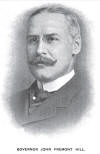
GOVERNOR JOHN FREMONT HILL
the titles of several hotels,
valuable business blocks and numerous
dwelling-houses are vested.
A business man of large interests, he is naturally
prominently associated with the banks of the capital
city, being President of the Augusta National Bank;
trustee of the Kennebec Savings Bank; and trustee of
the Augusta Trust Company.
In religious views, Governor Hill is a
Universalist, being a member and generous supporter
of that society. He belong to several social
clubs, among them being the Abnaki Club of Augusta,
Me.; the St. Louis Club, and the St. Louis Country
Club, St. Louis, Mo. He is a Mason, a member
of Augusta Lodge and Cushnoc Chapter, Trinity
Commandery and Kora Temple Shrine. He also
belongs to the Society of Colonial Wars, is
Vice-President of the Pepperrell Society, composed
of descendants of the famous family by that name; is
a member of the Society of Mayflower Descendants and
the Maine Historical Society.
May 19, 1880, Dr. Hill was married to Lizzie
G. Vickery, daughter of his partner, Hon. P.
O. Vickery; their only child, Percy, was
born March 16, 1881. He is now a student at
Princeton, of the Class of 1905. Mr. Hill
died Apr. 10, 1893. The Doctor was again
married in St. Louis, Apr. 25, 1897, to Mrs.
Laura Liggett, widow of Hiram S. Liggett
and daughter of Hon. Norman Colman, who was
Secretary of Agriculture in the first cabinet of
President Cleveland.
At present, Governor Hill and family reside in
the Blaine Mansion, on State Street,
in Augusta, which was for many years the home of the
illustrious statesman., Hon. James G. Blaine.
The Governor and wife are royal entertainers and
have given many receptions and social events in this
house, which have been characterized by their
elegant appointments. On the same street, a
short distance from the Blaine house, upon a
lot recently purchased at great expense and
occupying nearly a square in the center of the
residential portion of the city, Governor Hill
is having erected for his occupancy a handsome and
commodious residence, of St. Louis brick, with
trimmings of Maine granite.
Governor Hill has always been deeply interested
in the history of his native town and the genealogy
of its old families. It is largely due to his
encouragement and financial assistance that this
book ahs been written and published.
|
| MOSES
A. SAFFORD, ESQ.
It is a pleasure to the writer to present the face
of Moses A. Safford Esq., and to say a few
words about the man who has contributed so much
assistance to the production of his history of his
native town. He was born 28 Sept. 1833, son of
Edward
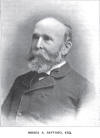
MOSES A. SAFFORD, ESQ.
D. and Mary R. (Lewis) Safford
and grandson of Rev. Moses Safford, founder
of pastor of the First Christian Church in Kittery.
He received his education in the public schools of
Kittery and at the Institute located at New Hampton,
N. H. After finishing his course of study
there he read law with Stillman B. Allen of
Kittery and was admitted to the bar in 1861.
On the breaking out of the Civil War he laid aside
the work of his profession for a while in order to
answer the call of the government for men and, 27
Nov. 1861, entered the United States naval service.
Receiving his discharge in 1865, he returned to the
practice of law.
He was Registrar of Probate from 1877 to 1885 and has
filled many offices of public trust, having served
his town as selectman, town agent and superintendent
of schools. As chairman of the Building
Committee of the Rice Public Library he devoted four
yeas in the effort to obtain a building worthy of
the donor of the fund and suited to the needs of the
people. This work he justly regards as one of
the most important and useful services that he has
rendered to his fellow-citizens.
Mr. Safford has always shown a deep interest in
local and colonial history and has contributed
several important articles to the Proceedings of the
Maine Historical Society, of which he is a member.
In the historical traditions of Kittery and vicinity
he is an authority, and my walks and talks with him
have been delightful and instructive.
Mr. Safford is a member of Naval Lodge, A. F. &
A. M., and commander of Edward G. Parker Post
of the Grand Army of the Republic. As a
gentleman of culture and a friend to every good
cause he is all the time exercising a quiet
influence to uplift his community in education and
good morals. For his family see genealogical
notes.
|
| HON.
HORACE MITCHELL.
Horace Mitchell was born in Kittery, 3 Mar.
1857, son of Reubena nd Hannah (Sayward) Mitchell.
His ancestors were among the first settlers of the
town, and the family name is widely known throughout
New England. He received his education in the
public schools of Kittery and in New Hampton
Literary Institute and Business College. He
then engaged in teaching and taught thirty-four
terms, thirty-three of them being in Kittery and one
in York. Having served as clerk in the
Marshall House at York, and in the Wentworth at
Newcastle, his attention was turned to the hotel
business. For five summers he conducted the
Pocahontas on Gerrish Island, and in 1890 he erected
the Champernowne at Warehouse Point. See page
58.
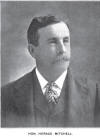
HON. HORACE MITCHELL
Mr.
Mitchell has always been a Republican in
politics and an able leader of the party in his
district. He represented Kittery in the House
in 1891, and Kittery and Eliot in 1893. He was
nominated for State senator by acclamation in 1895
and was elected, serving two years. In 1896
the Governor of Maine appointed him a commissioner
to examine the State Treasurer's accounts and in
1897 he served as chairman of the same commission.
He was Postmaster at the Point during President
Harrison's administration and has held the same
office since 1897. He has been president of
the school board two yeas and superintendent of
schools in 1898-9. In Masonry he has always
been interested, being a member of Naval Lodge,
Kittery, of Unity Chapter of Royal Arch Masons,
South Berwick, and of Bradford Commandery of
Biddeford. At present he is Grand Senior
Deacon of the Grand Lodge of Maine, Past Master of
the Naval Lodge, Past Grand of Riverside Lodge.
He is Past Patriarch of Dirigo Encampment,
Independent Order of Odd Fellows; Past Chancellor of
the Knights of Pythias; and the first Grand
Commander and Grand Keeper of the Records of the
Golden Cross of the State of Maine. All these
offices do not prevent him from doing a great amount
of business and taking an active interest in all
that pertains to the welfare of his native town.
He purchased and succeeded to the business of
Frank E. Rowell, attorney, in 1901. For
family see genealogy of the Mitchells on
another page.
|
|